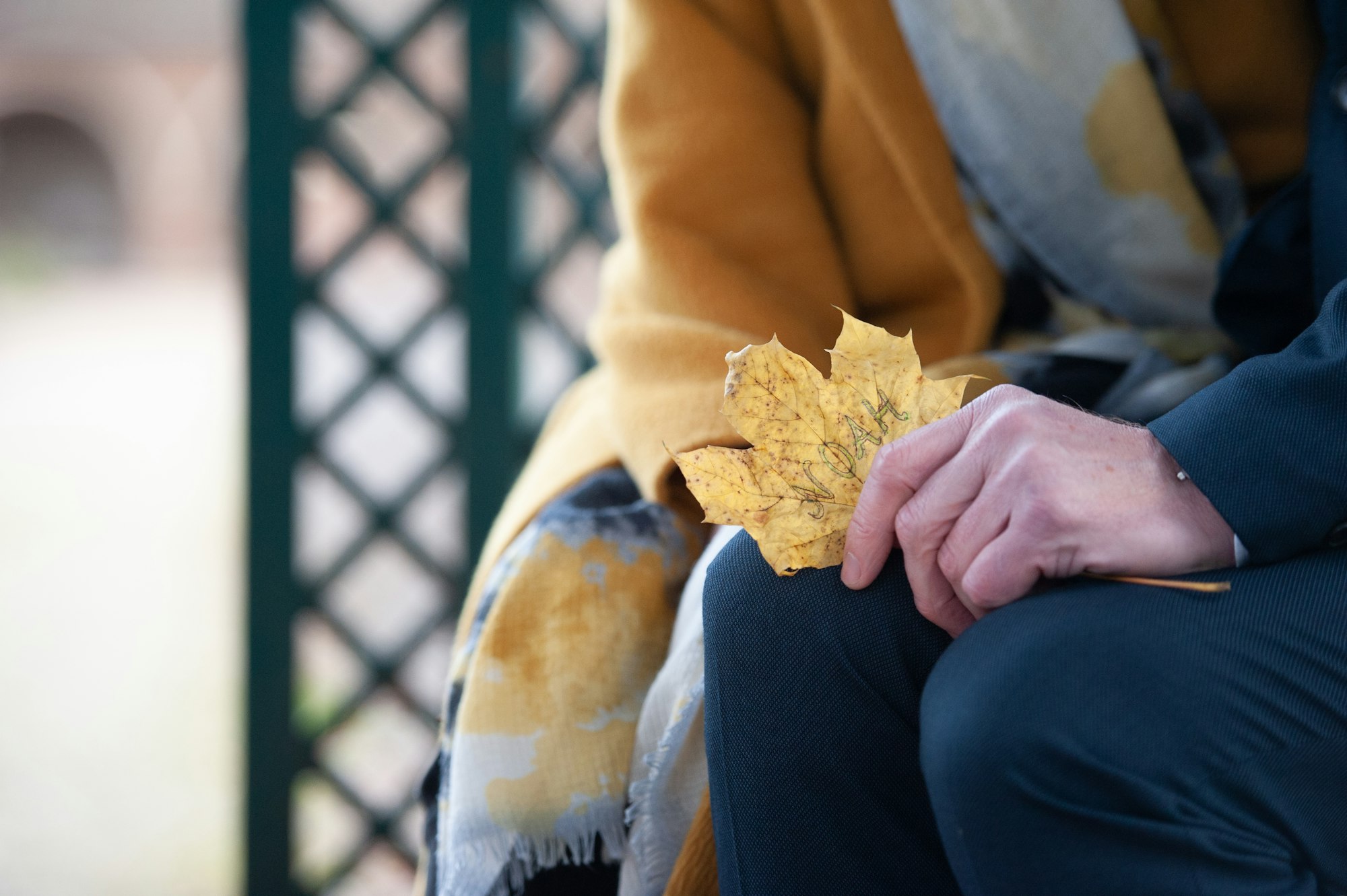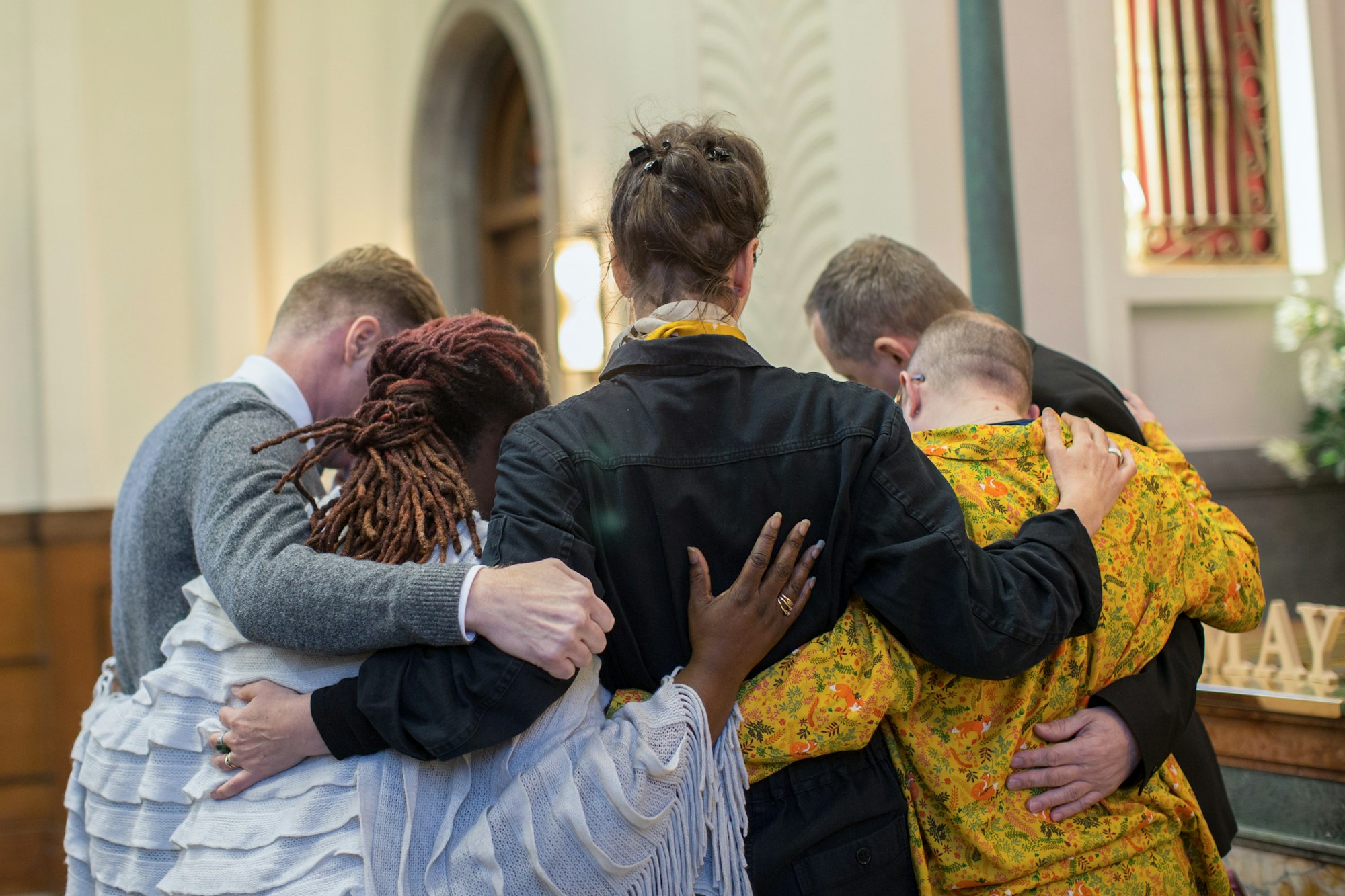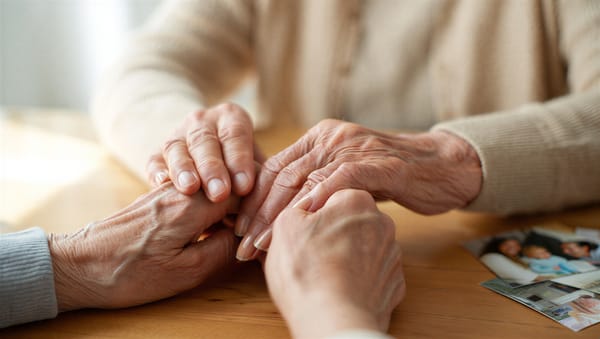Grief Support Groups: Finding Your Tribe in Loss
Are grief support groups right for you? Learn about different types of grief groups and how to find one that feels safe and helpful.

Key Takeaways
- Grief support groups provide community and validation from people who understand the unique pain of loss, helping reduce the isolation that often accompanies bereavement.
- Different types of groups serve different needs: loss-specific groups (widows, child loss, suicide survivors), general bereavement groups, online communities, and faith-based or secular options all offer distinct advantages.
- Evaluating a group's safety involves asking about facilitator credentials, group size, confidentiality policies, and observing whether members feel pressured or genuinely supported.
- You can attend groups as an observer initially, try multiple groups to find the right fit, and leave any group that doesn't feel emotionally safe without guilt or explanation.
- Group support often provides perspective on memorial decisions and grief timelines, helping members understand there's no "right way" to grieve or honor their loved ones.
Reflections on love, loss, and the ways we carry them.
In my years of working with grieving families, one truth has remained constant: no one is meant to carry loss alone. Grief can make the world feel unbearably quiet, especially when the calls stop coming and you’ve grown tired of reassuring everyone that you’re “doing fine.” For many, that silence becomes the moment they consider joining a grief support group, and just as quickly, talk themselves out of it. The fear of breaking down in front of strangers, of not belonging, or of discovering that everyone else seems to be coping better is incredibly common.
But what I’ve witnessed time and again is that the simple act of stepping into a room, physical or virtual, where you don’t have to pretend can be profoundly healing.
Last year, I worked with a woman named Elaine, whose husband died unexpectedly. For months she tried to navigate her grief privately, convinced that a support group would be too overwhelming. When she finally attended her first meeting, she barely spoke. Still, she kept going. One afternoon, another participant shared how choosing Parting Stone helped her family stay connected to their loved one. That moment opened something in Elaine. “For the first time,” she told me, “I felt less alone. Their stories helped me make decisions I’d been avoiding.”
Grief groups don’t erase sorrow, but they create a space where you can breathe again—slowly, gently, in the company of others who understand. Seeking support is not a sign of weakness; it’s an act of courage, and often, the beginning of feeling whole again.
Cathy Sanchez Babao
Parting Stone Grief Coach
When grief feels unbearably lonely, when friends have stopped checking in, when you're tired of pretending you're okay at work, the idea of joining a grief support group might cross your mind. You might immediately push the thought away. What if you break down in front of strangers? What if your grief isn't "bad enough" to qualify? What if everyone else seems to be handling loss better than you are?
These fears are completely normal. The decision to seek support in grief support groups is deeply personal, and there's no timeline or "right moment" for taking that step. Some people find immense comfort in connecting with others who understand their pain. Others discover that group settings aren't their preferred path through grief, and that's equally valid.
This article explores what actually happens in grief support groups, how to find one that feels safe, and how to evaluate whether group support might be helpful for your unique grief journey. Whether you're actively searching for a group or simply curious about what they offer, understanding your options can help you make the choice that feels right for you.

A New Way to Hold Close What Matters Most
We transform cremated remains into beautiful, touchable stones that bring comfort when you need it. Something you can hold, share, and keep close.
What Actually Happens in Grief Support Groups
The phrase "support group" can conjure images of awkward circles, forced sharing, and uncomfortable vulnerability. The reality is usually quite different. Most grief support groups are carefully structured spaces designed to feel safe rather than exposing.
In a typical grief group meeting, people gather in a comfortable setting: a community center, hospital conference room, faith community space, or even online via video call. Meetings usually last 60 to 90 minutes and follow a general pattern that helps participants know what to expect.
Many groups begin with introductions that respect people's comfort levels. You might be invited to share your name, who you lost, and how long ago, but you're never required to share more than feels comfortable. Facilitators typically establish ground rules early: what's shared in the group stays confidential, all feelings are valid, and no one is obligated to speak if they prefer to listen.
Sarah from Moriah, New York 🖤 shared: "I was having difficulty deciding on an urn. Parting stones also made it easier to share my husband's remains with our large, close-knit family. He was an avid rock collector as well, so everything about this made sense and has given me peace." Sarah's experience reflects how group connections often help people gain clarity about memorial decisions they're facing, as hearing others' experiences provides perspective without pressure.
The heart of most meetings involves guided discussion or themed topics. A facilitator might introduce a subject like "navigating the first holidays" or "talking to children about death," then invite participants to share their experiences if they wish. Some groups use structured activities like journaling prompts or creative expression, while others maintain a more conversational flow.
Importantly, grief groups differ significantly from group therapy in several ways:
| Grief Support Groups | Grief Therapy Groups |
|---|---|
| Often peer-led or facilitated by trained volunteers | Led by licensed mental health professionals |
| Focus on shared experience and mutual support | Focus on therapeutic intervention and healing techniques |
| Usually free or low-cost | Typically require payment or insurance |
| Open to anyone experiencing grief | May require assessment or referral |
| Drop-in attendance often welcomed | Regular attendance usually expected |
Understanding these distinctions can help you identify what type of support you're seeking. Both serve valuable purposes, and some people benefit from participating in both simultaneously.
@chloebluffcakes Thank you @partingstone 🤍 youve given me an unimaginable gift. One day I will share these with my little sister and carry her wherever we go in life together. #grief #partingstone #loss
♬ Repeat Until Death - Novo Amor
Types of Grief Support Groups
Not all grief support groups serve the same purpose or population. Understanding the landscape of available options can help you identify which type might resonate with your specific situation and needs.
Loss-Specific Groups
These groups bring together people who've experienced the same type of loss. The shared circumstances create immediate understanding that can feel profoundly validating.
- Widow/Widower Groups: Focused on navigating life after losing a spouse or partner, these groups address unique challenges like identity shifts, practical concerns about finances or homeownership, and the particular loneliness of losing your life companion. Many participants find comfort in hearing from others further along in their journey.
- Child Loss Groups: Perhaps the most specialized grief support communities, these groups serve parents who've experienced the death of a child at any age. Organizations like The Compassionate Friends create spaces where parents can discuss the devastating reality of outliving their children without encountering common but unhelpful platitudes. Research consistently shows that bereaved parents benefit significantly from connecting with others who've experienced this particular loss (Lichtenthal et al., 2011).
- Suicide Loss Survivors: These groups address the unique aspects of losing someone to suicide, including complicated feelings of guilt, anger, confusion, and social stigma. Participants often report that only others who've lost someone to suicide truly understand the specific pain and questions they carry.
- Pet Loss Groups: The death of a beloved animal companion can be deeply traumatic, yet pet loss is often minimized by society. Pet loss support groups validate the genuine grief that follows losing a cherished dog, cat, or other animal family member.
General Bereavement Groups
These groups welcome anyone experiencing grief regardless of their relationship to the deceased or circumstances of death. General bereavement groups offer broader community and often include people at various stages of their grief journey, which can provide hope and perspective.
Online Versus In-Person Considerations
The landscape of grief support has expanded significantly with digital options, especially following the COVID-19 pandemic. Both formats offer distinct advantages.
In-Person Groups:
- Physical presence and human connection
- Consistent meeting space creates ritual and routine
- Easier to form lasting friendships
- May offer refreshments and informal conversation time
Online Groups:
- Accessible from anywhere, eliminating transportation barriers
- More flexible scheduling across time zones
- Greater privacy (no one sees you at the community center)
- Options for camera-off participation when needed
- Ability to attend even during illness or mobility challenges
Cindy from Elgin, Illinois 🖤 described her experience: "I carry a small stone with me everywhere. I love having a little part of my son with me always." Her words reflect how grief support, whether found in person or online, helps people discover meaningful ways to maintain connection with those they've lost.
Faith-Based Versus Secular Groups
Some grief support groups integrate religious or spiritual perspectives, while others maintain a secular approach. Neither is inherently better; the right choice depends on your personal beliefs and what you find comforting.
Faith-based groups often incorporate prayer, scripture reading, or theological perspectives on death and afterlife. They can provide deep comfort for those whose faith is central to their identity. However, they may feel alienating if your beliefs differ from the group's religious framework.
Secular groups focus on the emotional and practical aspects of grief without invoking religious explanations or solutions. They welcome people of all faith backgrounds or no faith, creating space for diverse belief systems to coexist.

How to Find a Grief Support Group
Finding a grief support group that feels right requires knowing where to look and what questions to ask. Here's a practical roadmap for locating options in your area or online.
To find a grief support group, start with national organizations that maintain directories of local chapters: The Compassionate Friends for child loss, GriefShare for faith-based support, or TAPS for military loss. Contact local hospitals, hospices, or funeral homes, as they frequently host groups or can provide referrals. Search online for grief-specific platforms and consider asking your therapist, if you have one, for recommendations.
National Organizations With Local Chapters
Several well-established organizations maintain networks of grief support groups across the country:
- The Compassionate Friends: Specialized support for families grieving the death of a child at any age, with chapters throughout the U.S.
- GriefShare: Faith-based grief recovery program with searchable database of meetings
- TAPS (Tragedy Assistance Program for Survivors): Serving military loss families
- MISS Foundation: Supporting families after the death of a child
- Soaring Spirits International: For people who've lost a spouse or partner
Local Healthcare Institutions
Hospitals, hospice organizations, and mental health centers frequently offer grief support groups, often at no cost. Call your local hospital's behavioral health or social services department and ask about their grief support offerings. Many hospice organizations welcome anyone in the community experiencing grief, not just families they served during end-of-life care.
Funeral Home Networks
Many funeral homes either host grief support groups or maintain relationships with local grief counselors who facilitate them. If you worked with a funeral home during your loss, they may have information about support resources. For families who chose cremation, some funeral homes partner with organizations that offer memorial options alongside grief support resources.
Online Grief Communities
Digital grief support has expanded significantly, offering immediate access to community:
- Grief in Common: Structured video support groups
- The Dinner Party: Peer-hosted gatherings for people in their 20s, 30s, and early 40s
- Facebook Groups: Search for loss-specific groups; read group rules carefully before joining
- What's Your Grief: Educational resources plus community forums
- Reddit (r/GriefSupport, r/widowers): Anonymous peer support available 24/7
Professional Referrals
If you're working with a therapist, primary care doctor, or clergy member, ask them for grief support group recommendations. Mental health professionals often maintain lists of reputable groups and can help match you with options aligned with your needs.
Jarek from Warwick, Rhode Island 🖤 shared: "Today, her Parting Stones are with every family member serving as a healing moment every time we hold it. I take her everywhere I go." His experience illustrates how group support often helps families discover meaningful ways to honor their loved ones while navigating their individual grief journeys.

Evaluating Whether a Group Is Right for You
Not every grief support group will feel like the right fit, and that's completely acceptable. Knowing what to look for can help you assess whether a particular group serves your needs and respects your emotional boundaries.
Green Flags: Signs of a Healthy Group
Emotionally safe grief support groups share certain characteristics that indicate thoughtful facilitation and healthy dynamics:
- Clear Boundaries and Confidentiality: The group explicitly discusses confidentiality rules and consequences for violations. Members understand what can and cannot be shared outside the group.
- Trained Facilitators: Someone with grief counseling training or extensive experience guides the group, managing time fairly and intervening if dynamics become unhealthy.
- Voluntary Participation: No one is forced to share. Observers are welcomed. People can say "I'd rather not talk about that" without judgment or pressure.
- Diverse Grief Expressions: The group validates different ways of grieving rather than implying there's a "right way." Tears are accepted, but so is laughter, anger, or simply sitting quietly.
- Respect for Individual Timelines: No one suggests you should be "over it" or "further along" by now. The group understands that grief doesn't follow a schedule.
Red Flags: Warning Signs to Watch For
Certain dynamics indicate a group may not provide the support you need:
- Toxic Positivity: If members minimize pain with phrases like "everything happens for a reason" or pressure you to "look on the bright side," the group may not offer genuine emotional validation.
- Dominating Voices: When one or two people monopolize discussion time consistently, or the facilitator fails to ensure everyone who wants to speak has opportunity, other members' needs aren't being met.
- Lack of Professional Oversight: Peer support is valuable, but completely unstructured groups without any trained leadership can sometimes enable unhealthy grief patterns or become outlets for unprocessed trauma.
- Pressure to Participate: If you feel coerced to share before you're ready, or if the group culture suggests observing is somehow insufficient, trust that discomfort.
- Judgment About Choices: Healthy groups respect individual decisions about memorial services, whether to date again, how to handle belongings, and other deeply personal choices. Judgment about such decisions signals the group may not provide safe space.
Questions to Ask Before Joining
Before committing to a group, consider asking the facilitator or organizer:
- What training or credentials do facilitators have?
- How large is the group typically?
- Is attendance drop-in, or is regular participation expected?
- Are there any costs associated with participation?
- What happens if I don't want to share in a particular session?
- How does the group handle conflicts or situations where someone is struggling significantly?
- Is the group faith-based, and if so, what tradition?
These questions aren't intended to be confrontational, but rather to help you gather information about whether the group aligns with your needs and comfort level.
When Individual Therapy Might Be Better Suited
Grief support groups serve many people well, but individual therapy might be more appropriate if you're experiencing:
- Complicated grief that significantly impairs daily functioning
- Trauma from the circumstances of the death
- Pre-existing mental health conditions that require clinical attention
- Such intense emotions that group settings feel overwhelming
- Need for personalized coping strategies rather than general peer support
Many people benefit from both individual therapy and group support simultaneously. The approaches complement rather than compete with each other, offering different types of assistance during your grief journey (Currier et al., 2008).
@ohthatjenny If you would like more information on Parting Stone and the process please dont hesitate to ask. I feel so confident that Chris would love this way of keeping his memory alive. He is SO missed and loved still and always. #partingstone #partingstones #lifeafterloss #griefandloss @PartingStone
♬ original sound - Jenny
What to Expect in Your First Meeting
Walking into your first grief support group meeting can feel intimidating. Understanding typical first-meeting experiences can reduce anxiety and help you prepare emotionally.
Most groups recognize that attending for the first time requires significant courage. Facilitators are typically aware of newcomers and may check in briefly with you before the meeting begins. This isn't interrogation; they simply want to welcome you and answer any immediate questions about how the meeting will flow.
You'll likely be invited to introduce yourself, but you can share as much or as little as feels comfortable. Many people simply offer their first name, who they lost, and how long ago. Some prefer to say "I'd rather just listen today," which facilitators generally honor without question.
The first meeting is fundamentally about observation. You're assessing whether the group's energy, approach, and membership feel aligned with your needs. You're under no obligation to return if it doesn't feel right, and you're equally welcome to return if it does.
Ginger from Arlington Heights, Illinois 🖤 described: "In times of grief, it soothes my heart to 'hold' my mom close. My children, who weren't able to meet my mom, not only have the stories I share, but can also hold the stone we kept and be reminded of her." Her experience shows how connecting with others in grief often helps people discover personally meaningful ways to maintain bonds with those they've lost.
Many people feel emotional relief after their first meeting simply from being in a room where they don't have to pretend, explain, or minimize their pain. Others leave feeling uncertain, which is also completely normal. Give yourself permission to try multiple meetings before deciding whether the group serves your needs.
Protecting Your Boundaries
Remember that you control how much you share and how deeply you engage. If a topic feels too painful, you can simply say "I'm not ready to discuss that yet." If you need to step outside for a few minutes, do so without apology. If you realize mid-meeting that the group isn't the right fit, it's acceptable to leave quietly.
Your emotional safety is paramount. Trust your instincts about what feels supportive versus what feels intrusive or overwhelming.

Common Concerns About Grief Groups
Many people hesitate to join grief support groups because of specific worries. Addressing these concerns directly can help you make informed decisions about whether group support might help your grief journey.
"Will It Make My Grief Worse?"
This fear is incredibly common. You might worry that hearing others' painful stories will intensify your own suffering or that the meeting will leave you emotionally depleted.
Research on grief support groups suggests the opposite is generally true. While meetings certainly involve discussing painful topics, most participants report that sharing grief in community actually provides relief rather than increasing distress (Lund et al., 2010). The validation of having your experience understood and witnessing others' resilience often creates hope rather than despair.
That said, some people find certain types of stories triggering. If your loss involved particular circumstances that feel too raw to hear about in others' experiences, it's acceptable to attend groups that don't focus specifically on those circumstances, or to tell the facilitator about topics you need to avoid initially.
"What If I Cry Too Much or Not Enough?"
Grief groups see the full spectrum of emotional expression. Some people cry throughout meetings. Others sit quietly without tears. Both responses, and everything in between, are completely normal and accepted in healthy grief support spaces.
Different people process grief in different ways, and the same person may experience grief differently at various times. Crying doesn't indicate weakness, and not crying doesn't suggest you didn't love deeply. Healthy groups understand this and create space for diverse expressions of grief.
If you're concerned about crying in front of others, remember that grief group participants are there because they understand profound loss. They won't judge your tears; they'll likely recognize their own pain reflected in yours.
"What If My Grief Isn't 'Bad Enough'?"
Many people worry they don't qualify for grief support because others have experienced "worse" losses, or because they're functioning adequately in daily life despite their pain.
Here's the truth: if you're hurting enough to consider joining a grief support group, your grief is "bad enough." There's no minimum threshold of suffering required for admission. Grief groups welcome people experiencing all intensities of loss, from those completely overwhelmed to those managing but seeking connection.
Research on bereavement consistently shows that comparing grief experiences is neither helpful nor accurate. Each loss carries its own weight, shaped by the relationship, the circumstances, the person's support system, and countless other factors (Stroebe & Schut, 1999). Your grief deserves acknowledgment and support regardless of how it compares to anyone else's experience.
"What If I Don't Relate to Anyone?"
You might attend a group and feel disconnected from other participants. Perhaps they're all much older or younger, or their circumstances feel vastly different from yours, or their way of processing grief doesn't resonate with your experience.
This disconnection is a common reason people try multiple groups before finding the right fit, or decide that group support isn't their preferred path through grief. Both outcomes are perfectly acceptable.
However, many people who initially feel disconnected discover that beneath surface differences, the core experience of grieving someone deeply loved creates profound common ground. Give yourself a few meetings before deciding, if possible. Sometimes connection develops gradually as trust builds.
Cremated remains can feel messy and meaningless. Instead of receiving a box of ashes following cremation, you can now receive a collection of stones. Solidified remains let you feel connection with the remains of your departed. Turn your ashes into stones at https://partingstone.com
Building Connections Beyond the Group
While grief support groups serve an important function during meetings, some of the most valuable aspects emerge from the connections that extend beyond the structured session time.
Many grief support group participants develop genuine friendships with people they meet through their shared experience. These friendships often feel different from other relationships because they're founded on mutual understanding of profound loss. You don't have to explain why you're still struggling months or years after your loss; your grief friends already understand.
Some groups facilitate informal connections by sharing contact information among willing participants or organizing optional social activities outside regular meetings. Others maintain strict boundaries, limiting connection to the meeting space itself. Neither approach is superior; they simply serve different preferences and needs.
Nancy from Las Cruces, New Mexico 🖤 shared: "I placed the stones around his last project on our property, where we had lived 16 years, and it is a constant reminder of him, but in a great way!" Her experience reflects how connections made through grief support often inspire personally meaningful ways to honor loved ones.
How Groups Inform Memorial Perspectives
One valuable but often unexpected benefit of grief support groups involves gaining perspective on memorial decisions. Hearing how others have approached choices about cremated remains, memorialization, and creating ongoing connections with deceased loved ones can illuminate options you hadn't considered.
Group members often share experiences with various memorial choices, including traditional options like urns and cemetery plots, as well as alternatives like scattering ashes in meaningful locations or choosing solidified remains ($2,495 for human remains, $1,195 for pets), which transform cremated remains into smooth, touchable stones that can be shared among family members or kept close. These conversations typically focus on what felt meaningful rather than prescribing what others should do, respecting each person's unique relationship with their deceased loved one.
The perspective gained through group discussions often helps people understand that there's no "right time" for memorial decisions. Some people find clarity about memorialization shortly after loss, while others need months or years before they feel ready to make choices. Both timelines are completely valid, and others' journeys can inform (but should never dictate) your own path.
The Natural Progression of Grief Friendships
Grief friendships often evolve in interesting ways. Some remain connected to the grief support context, with people maintaining contact primarily around grief-related topics or during difficult dates like anniversaries. Other friendships expand beyond grief, developing into genuine connections where the shared loss that brought people together becomes just one aspect of a broader relationship.
Some people gradually withdraw from their grief support group and associated friendships as their grief transforms and they feel less need for that specific type of support. This transition is natural and healthy, not a betrayal of the group or the friendships formed there.

Conclusion
Deciding whether to join a grief support group is a deeply personal choice that depends on your individual needs, preferences, and circumstances. Groups offer valuable community, validation, and perspective from people who understand the unique pain of loss, but they aren't the only path through grief, and they aren't the right choice for everyone.
If you're considering group support, remember that you can try multiple groups before committing, attend as an observer initially, and leave any group that doesn't feel emotionally safe. Your comfort and healing should always guide your choices about grief support.
The courage it takes to reach out for support during grief demonstrates strength, not weakness. Whether you choose group support, individual therapy, informal connections with understanding friends, or a combination of approaches, honoring your own needs while navigating loss is an act of profound self-respect.
For additional grief resources and support, consider exploring organizations like the National Alliance for Grieving Children, the Association for Death Education and Counseling, or speaking with a grief counselor who can help identify the support options best suited to your unique journey.
Frequently Asked Questions
How do I know if I'm ready for a grief support group?
There's no specific timeline or checklist that indicates readiness for a grief support group. You might consider attending if you're feeling isolated in your grief, if friends and family seem uncomfortable with your ongoing pain, or if you're simply curious about connecting with others who understand loss. Many people attend their first meeting while still in early, intense grief, while others wait months or years. Both approaches are completely valid. If you're wondering whether you're ready, that curiosity itself might be worth exploring by attending a meeting and seeing how it feels. You can always leave if it's not the right time.
Are online grief support groups as effective as in-person meetings?
Research suggests that online grief support groups can be just as beneficial as in-person meetings for many participants. Online groups offer accessibility advantages (no transportation barriers, available across time zones, can attend from home during illness or difficult days) and may feel less intimidating for people anxious about in-person vulnerability. However, some people find that physical presence creates deeper connection and that informal conversation before and after meetings builds community in ways video calls don't replicate. The "best" format depends entirely on your personal preferences, comfort level, and practical circumstances.
What if I attend a grief group and start crying uncontrollably?
Intense emotions, including tears, are completely normal and expected in grief support groups. Facilitators and other members understand that grief involves powerful feelings, and healthy groups create space for emotional expression without judgment. If you become very emotional, the facilitator may check in gently to ensure you're okay, but you won't be asked to leave or told to calm down. Many people who initially worried about crying too much discover that being in a space where tears are understood rather than uncomfortable provides immense relief. If you need to step outside briefly to collect yourself, that's also perfectly acceptable.
How long should I stay in a grief support group?
There's no prescribed duration for grief group participation. Some people attend for a few months and then feel ready to transition away from formal grief support. Others find value in continued participation for years, particularly with loss-specific groups where ongoing connection with people who understand their particular type of loss feels sustaining. Some people leave and then return during difficult times like anniversaries or holidays. All of these patterns are normal and healthy. Trust your own sense of whether the group continues to serve your needs, and give yourself permission to leave when it feels right.
Can I attend multiple grief support groups at the same time?
Yes, many people benefit from participating in multiple groups simultaneously. You might attend both a loss-specific group (like a widows support group) and a general bereavement group, or combine in-person meetings with online communities. Different groups often serve different needs. One might provide connection around your specific type of loss, while another offers broader community or focuses on particular aspects of grief work. There's no limit on the number of support resources you can access. Use whatever combination of support feels helpful for your unique grief journey.
What should I do if someone in my grief group says something hurtful or judgmental?
First, trust your feelings. If something feels hurtful, your response is valid even if the person didn't intend harm. In a well-facilitated group, you can raise the concern either in the moment ("That comment didn't feel supportive to me") or privately with the facilitator afterward. Healthy facilitators will address problematic dynamics and reinforce group guidelines about respect and validation. If the facilitator doesn't respond appropriately or if hurtful patterns continue, that's valuable information suggesting the group may not provide the safe space you deserve. You can try a different group without guilt or obligation to explain your departure.
References
Currier, J. M., Holland, J. M., & Neimeyer, R. A. (2008). Making sense of loss: A content analysis of end-of-life practitioners' therapeutic approaches. Omega: Journal of Death and Dying, 57(2), 121-141. https://doi.org/10.1177/0030222808316799
Lichtenthal, W. G., Cruess, D. G., & Prigerson, H. G. (2011). A case for establishing complicated grief as a distinct mental disorder in DSM-V. Clinical Psychology Review, 24(6), 637-662. https://doi.org/10.1016/j.cpr.2004.07.002
Lund, D. A., Caserta, M. S., de Vries, B., & Wright, S. (2010). Restoration after bereavement. The Gerontologist, 50(4), 493-503. https://doi.org/10.1093/geront/gnt118
Stroebe, M., & Schut, H. (1999). The dual process model of coping with bereavement: Rationale and description. Death Studies, 23(3), 197-224. https://doi.org/10.1080/074811899201046
Association for Death Education and Counseling. (2024). Find a grief counselor. https://www.adec.org
GriefShare. (2024). Grief support groups and seminars. https://www.griefshare.org
HelpGuide. (2024). Grief support groups. https://www.helpguide.org/articles/grief/grief-support-groups.htm
National Alliance for Grieving Children. (2024). Find grief support. https://childrengrieve.org
Psych Central. (2024). Grief support groups: Types, benefits, and how to find one. https://www.psychcentral.com/grief/grief-support-groups
The Compassionate Friends. (2024). Finding support after child loss. https://www.compassionatefriends.org
What's Your Grief. (2024). Grief support groups: What to expect and how to find one. https://www.whatsyourgrief.com/grief-support-groups








